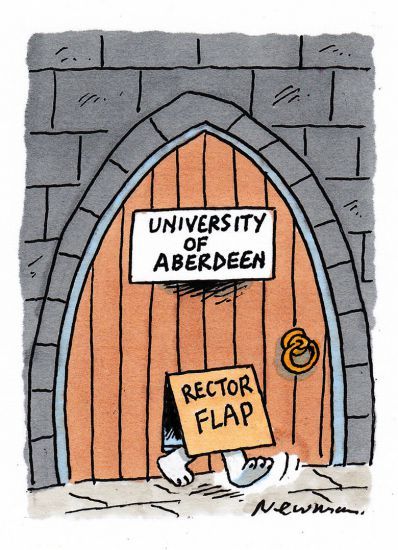
Concerns are mounting about how British farmers will be able to recruit the labourers needed to pick fruit in the summer once the country leaves the European Union. Fortunately, Aileen Hammond of London had the solution in her letter to The Guardian, published on 14 February: get undergraduates to do it. Under her vision of national service, “all students in tertiary education could be required to register for work in seasonal agriculture” and universities “should organise their term times and vacations in accordance with the needs of the nearest agricultural areas”. Such a policy could have wider benefits, Ms Hammond went on: the students’ wages could be used to reduce their tuition fees and owners of former labourers’ cottages who used them as second homes could perhaps be persuaded to “give them up for a month or two a year”. It all sounds so simple; why had no one thought of this before?
There are some illustrious names among the former rectors of the University of Aberdeen: Winston Churchill, Andrew Carnegie and, erm, Clarissa Dickson Wright. Now, students at the Scottish institution are calling for an entirely different type of leader to represent their interests: a white cat named Buttons. More than 400 students have signed a petition calling for the resident campus moggy to be allowed on the ballot after the university said that he did not meet the requirements of being a charity trustee – being a human. Alex Kither, a third-year history student and Buttons’ campaign manager, told The Scotsman that Buttons would make an excellent rector, since “he lives on campus, he interacts with students and he’s fluffy”. Mr Kither added that having a cat would strike an important blow for animal-human equality. “You have Larry the Cat, who is now an important figure at Westminster, [the penguin] Sir Nils Olav, who is colonel-in-chief of the Norwegian King’s Guard, and a cat in Alaska was mayor for 20 years. The times are changing,” he said.
Forget reds under the beds: these days Americans should be looking in their lecture theatres if they want to find communist infiltrators, according to the director of the Federal Bureau of Investigation. Christopher Wray told the Senate intelligence committee that China had placed operatives in US universities, “whether it’s professors, scientists, [or] students”, and that the bureau had to monitor them from its 56 field offices throughout the nation, news agency McClatchyDC reported on 14 February. Mr Wray added that the FBI was “watching warily” activities at Chinese-sponsored Confucius institutes in US universities. With about 350,000 Chinese students enrolled in US higher education – about one-third of all foreign learners in the country – it sounds like the FBI is going to have its hands full.
British newspapers have been full to the brim this week with stories about the launch of a higher education funding review in England. Fortunately, there was still space for regular tales of students’ alcohol-fuelled misbehaviour. Oxford University Conservative Association provided one of the more memorable stories, of course, with the Daily Mirror reporting that a weekly Port and Policy event had been marred by members behaving abusively after downing up to 43 glasses of port each. Organisers of the event who refused to serve more drinks were allegedly shouted down by one reveller screaming “I’ll buy their families”, before the scene moved to the nearby King’s Arms pub, where one young Tory reportedly told locals that “My castle’s bigger than yours.” Mercifully, it will be a few years before they are running the country.
Elsewhere in the UK, students’ late-night revelry has taken on a rather different flavour, with The Sun reporting on how Sir David Attenborough-themed raves were touring the country’s university cities. At the parties, episodes of Blue Planet are streamed behind the DJ all night and attendees wear masks of the naturalist’s face, according to the newspaper, which said that the mix of funk, soul, disco and house music was interspersed with clips of Sir David’s voice. The event has already visited Leeds and Liverpool and is set to head to cities including Cambridge, Southampton and Cardiff in the coming weeks. Sir David, 91, is “kind of an icon among students”, Louis Jadwat, co-founder of the events company behind “David Attenborough’s Jungle Boogie”, was quoted as saying.
Register to continue
Why register?
- Registration is free and only takes a moment
- Once registered, you can read 3 articles a month
- Sign up for our newsletter
Subscribe
Or subscribe for unlimited access to:
- Unlimited access to news, views, insights & reviews
- Digital editions
- Digital access to THE’s university and college rankings analysis
Already registered or a current subscriber? Login



